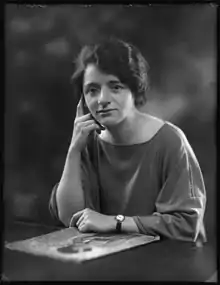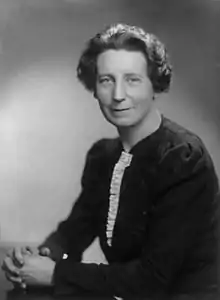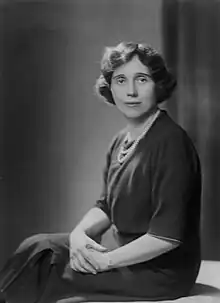Ministry of Education (United Kingdom)
The Ministry of Education (1944-1964) was a central government department governed by the Minister of Education, with responsibility in England and Wales for:
- Promoting the education of people;
- Developing educational institutions;
- Developing policy to provide a comprehensive educational service;
- Securing the effective execution of the education policy by local education authorities[1]
The Ministry of Education was created by the Education Act 1944.[1]
Scottish education was subject to the Education (Scotland) Act 1945 whereby the Scottish Office, under the Secretary of State for Scotland, undertook similar responsibilities to the Ministry of Education but for Scotland.[2]
Northern Irish education was subject to the Education Act (Northern Ireland) 1947, passed by the Northern Ireland parliament at Stormont, which provided powers to the Minister of Education to:
- appoint members of the Northern Ireland Advisory Council for Education
- appoint additional members of education committees for Northern Ireland local education authorities[3]
History
The Ministry of Education was created by the Education Act 1944[1] and was preceded by the Board of Education,[4] which had been created by the Board of Education Act 1899. The Ministry of Education lasted twenty years until 1964, when it was merged with the Ministry of Science to create the Department of Education and Science. This reorganisation followed the recommendations of the Robbins Committee on Higher Education.[5]
Ministers
The Minister of Education was in charge of the Ministry of Education and was in effect a corporation sole.[1] The following members of parliament or members of the house of lords have held the office: -
Colour key (for political parties):
Conservative
Labour
| Name | Portrait | Term of office | Length of term | Party | Prime Minister | |||
|---|---|---|---|---|---|---|---|---|
| R. A. Butler |  |
3 August 1944 | 25 May 1945 | 9 months and 22 days | Conservative | Winston Churchill (War Coalition) | ||
| Richard Law |  |
25 May 1945 | 26 July 1945 | 2 months and 1 day | Conservative | Winston Churchill (Caretaker Min.) | ||
| Ellen Wilkinson |  |
3 August 1945 | 6 February 1947 (died in office) |
1 year, 6 months and 3 days | Labour | Clement Attlee | ||
| George Tomlinson | 10 February 1947 | 26 October 1951 | 4 years, 8 months and 16 days | Labour | ||||
| Florence Horsbrugh |  |
2 November 1951 | 18 October 1954 | 2 years, 11 months and 16 days | Conservative | Sir Winston Churchill | ||
| David Eccles |  |
18 October 1954 | 13 January 1957 | 2 years, 2 months and 26 days | Conservative | |||
| Sir Anthony Eden | ||||||||
| The Viscount Hailsham |  |
13 January 1957 | 17 September 1957 | 8 months and 4 days | Conservative | Harold Macmillan | ||
| Geoffrey Lloyd | 17 September 1957 | 14 October 1959 | 2 years and 27 days | Conservative | ||||
| David Eccles |  |
14 October 1959 | 13 July 1962 | 2 years, 8 months and 29 days | Conservative | |||
| Sir Edward Boyle, Bt | 13 July 1962 | 1 April 1964 | 1 year, 8 months and 19 days | Conservative | ||||
| Sir Alec Douglas-Home | ||||||||
Parliamentary Secretaries
The Minister of Education could appoint a Parliamentary Secretary[1] who was the junior minister in the Ministry of Education albeit still a political appointment. The following members of parliament have held the office: -
Colour key (for political parties):
Conservative
Labour
| Name | Portrait | Status | Party | Term of office | Length of term | Minister of Education | |||
|---|---|---|---|---|---|---|---|---|---|
| James Chuter Ede | )%252C_Bestanddeelnr_900-7223.jpg.webp) |
MP | Labour | 13 August 1944 | 23 May 1945 | 9 months and 10 days | R. A. Butler | ||
| Thelma Cazalet-Keir |  |
MP | Conservative | 26 May 1945 | 26 July 1945 | 2 months and 1 day | Richard Law | ||
| Arthur Jenkins | MP | Labour | 4 August 1945 | 30 October 1945 | 2 months and 27 days | Ellen Wilkinson | |||
| David Hardman |  |
MP | Labour | 30 October 1945 | 26 October 1951 | 5 years, 11 months and 26 days | |||
| George Tomlinson | |||||||||
| Kenneth Pickthorn | MP | Conservative | 5 November 1951 | 18 October 1954 | 2 years, 11 months and 13 days | Florence Horsbrugh | |||
| Dennis Vosper | MP | Conservative | 18 October 1954 | 13 January 1957 | 2 years, 2 months and 26 days | David Eccles | |||
| Sir Edward Boyle | MP | Conservative | 18 January 1957 | 14 October 1959 | 8 months and 26 days | The Viscount Hailsham | |||
| Geoffrey Lloyd | |||||||||
| Kenneth Thompson | MP | Conservative | 22 October 1959 | 13 July 1962 | 2 years, 8 months and 21 days | David Eccles | |||
| Christopher Chataway | .jpg.webp) |
MP | Conservative | 16 July 1962 | 1 April 1964 | 1 year, 8 months and 16 days | Sir Edward Boyle, Bt | ||
Civil Service
The administration of the Ministry of Education was undertaken by the civil service under the leadership of the Permanent Secretary of Education.
| Name | Term of office | |
|---|---|---|
| Sir Maurice G. Holmes, G.B.E., K.C.B. | 1944 | 1945 |
| Lord Redcliffe-Maud, G.C.B., C.B.E. | 1945 | 1952 |
| Sir Gilbert N. Flemming, K.C.B. | 1952 | 1959 |
| Dame Mary Smieton, D.B.E. | 1959 | 1963 |
| Sir G. Herbert Andrew, K.C.M.G., C.B. | 1963 | 1964 |
Organisation
The Ministry of Education was organised into branches which were constantly re-organised over the twenty years of the ministry, but the following list is of the branches which have existed at one time or another: -
| Branch | Responsibility for |
|---|---|
| Teachers Branch[7] | Teacher recruitment (including qualification criteria & entrance exams) and teacher training through specialist teacher training colleges ensuring an adequate supply of teachers. |
| Medical Branch[8][9] | School clinics & nurses for medical treatment of children and provision of school meals and milk for those in nutritional need |
| Special Services Branch[10] | Special education services for blind, deaf, handicapped (physical & mental), epileptic, maladjusted and delicate children |
| Information Branch[11] | Distribution of information to educators, institutions and local education authorities through means such as circulars and memorandum |
| External Relations Branch[11] | Distribution of information to the general public including films, exhibitions at conferences, liaising with the press, publications and ministerial briefings for announcements in parliament & press interviews. |
| Further Education Branch[12] | Provision of further education including evening institutes, juvenile instruction centres, short courses, books needed at public libraries, residential colleges, polytechnics, vocational courses, agricultural colleges, sports, arts etc. etc.
This branch was later sub-divided into the University Branch and Adult Education and Youth services Branches |
| Finance Branch[13] | Expenditure, accountancy & budget estimates which gave the branch considerable influence over the formulation and execution of policy |
| Schools Branch[14] | Interpretation of the Education Act 1944 was subject to 'precedents' from a body of knowledge and previous decisions by at least Assistant Secretary or the Legal Branch. |
| Architects and Building Branch[15] | Building of school & educational institute premises including policy, building regulations, internal fittings, planning requirements, equipment etc. |
| Awards Branch[16] | For aid and grants to students through state scholarships and local education authority awards. Financial assistance was extended to those in universities, with particular emphasis on scientific scholarships. |
| Inspectorate[17][18] | Separate inspectorates existed for England and Wales. The inspectorate carried out compulsory inspections of schools and educational institutes and reported deficiencies requiring remediation. In addition policy was reviewed & revised through panels from reports and surveys from the inspectorate. |
| Welsh Department[19] | Special considerations for Welsh schools including the Welsh language and low population rural schools |
| Legal Branch[20] | Decisions on how acts of parliament should be interpreted. This is for uncertain cases, whereas the Schools Branch deflected cases where a precedent already existed. Legal opinions were given by the Law Officers of the Crown ( Attorney General and the Solicitor General) in response to enquiries concerning points of law. |
| UNESCO Branch[21] | Engagement with United Nations Educational, Scientific and Cultural Organisation (UNESCO) |
| Salaries Branch[22] | Salary scales for teachers |
| Establishments Branch[23] | Ministry of Education staff and Inspectorate concerning changes in office procedure or organization, promotions, allowances and formation of new committees. Effectively equivalent to a modern day HR department |
| Statistics Branch[24] | The collection and presentation of statistics such as the level of supply of teachers, appraising shortages of, for example, science and technology graduates, numbers of immigrant pupils etc. |
| Research and Intelligence Branch[25] | Keeping ministers informed of educational research and identified areas of promise. It grant-aided and commissioned research from universities using a fund but did not undertake any research itself. Additional funds were set aside for bodies such as the Central Advisory Councils for Education in England and Wales, the National Foundation for Educational Research, the Curriculum Study Group and, initially, the Schools Council. |
Central Advisory Councils for Education
The Education Act 1944 set-up two Central Advisory Councils for Education, one for England and one for Wales. The Minister of Education appointed the members of each council which were mainly made-up of:[26] -
- Senior and experienced educators in the public education system (e.g. a senior experienced & highly qualified nursery nurse)
- Scholars in the theories of learning who were often university professors
The Ministry of Education provided secretaries to the councils and funded their time, the Minister appointed the chairmen of the councils.
The councils advised the minister on questions raised by the minister or issues identified by the councils.
The advice was either made public through published reports or kept confidentially within the ministry.
References
- "Education Act". Legislation.gov.uk. Section 1. 1944 – via The National Archives.
- "Education (Scotland) Act". Legislation.gov.uk. Part III - Administration & Staffing. 1945 – via The National Archives.
- "Education Act (Northern Ireland) 1947". Legislation – via Education England.
- "Education Act". Legislation.co.uk. Section 2. 1944 – via The National Archives.
- "Records created or inherited by the Department of Education and Science". National Archives.
- Mackie, Colin (20 July 2020). "British Civil Servants (1900 - present)". Colin Mackie's website.
- "Ministry of Education, Teachers Branch: Local Education Authority, Teachers' Training and Supply". National Archives.
- "Ministry of Education: Medical Branch : Local Education Authority: School Meals Service". National Archives.
- "Ministry of Education: Medical Branch (M Series)". National Archives.
- "Department of Education : Medical Branch and Special Services Branch". National Archives.
- "Records of the Ministry of Education; - Information and External Relations Branch". National Archives: 1.
- "Ministry of Education, Further Education Branch". National Archives.
- "Ministry of Education; Records of Finance Branch". National Archives.
- "Ministry of Education: Schools Branch: Precedent Folders". National Archives.
- "Ministry of Education Architects and Building Branch". National Archives.
- "Ministry of Education Awards Branch". National Archives.
- "Ministry of Education, Inspectorate (England)". National Archives.
- "Ministry of Education, Inspectorate (Wales)". National Archives.
- "Ministry of Education: Welsh Department". National Archives.
- "Ministry of Education, Legal Branch". National Archived.
- "Ministry of Education: UNESCO Branch". National Archives.
- "Ministry of Education; Salaries Branch". National Archives.
- "Ministry of Education: Establishments Branch". National Archives.
- "Ministry of Education; Statistics Branch". National Archives.
- "Records of Research and Intelligence Branch". National Archives.
- "Education Action 1944". Legislation.co.uk. Section 4 - Central Advisory Councils for Education.